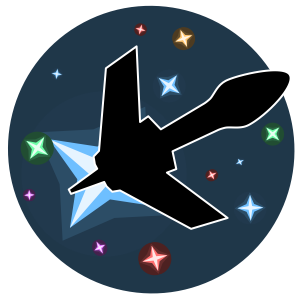Welcome to Kestrel! This project has the aim of developing a modern, cross platform game engine that can be used to recreate and remaster Classic Macintosh era games. It does this providing a number of APIs and facilities for reading and handling old formats from the classic era.
Kestrel is being used by the upcomming Cosmic Frontier: Override, a remastering of the classic Escape Velocity: Override.
Games in the Kestrel game engine are developed entirely within Lua, with all game assets and scripts being assembled into resource files. This can actually use either modernized formats, the old classic formats, or even a mix of the two. There will be more information about developing games for Kestrel in a future guide.
Currently Kestrel is reimplementing a number of technologies from the classic era, including; ResourceForks (mostly complete), QuickDraw (partial) and QuickTime (Sound Resource). Additional technologies will be introduced in the future and the existing ones will be fleshed out further.
Kestrel currently supports the following systems, though more are planned in the future.
- macOS
- Intel 64-bit (x86_64)
- Apple Silicon (arm64)
- Linux
- Intel 64-bit (x86_64)
- Windows
- Intel 64-bit (x86_64)
This question gets asked a lot. Why not just completely use modern technologies. Why bother to deal with old technologies at all?
Kestrel's early development has been for the most part guided by the requirements of Cosmic Frontier. One of the goals with the project is that it should retain compatibility with old plug-ins Escape Velocity plug-ins. This necessitates being able to handle the old formats in some capacity. The other factor is the natural way in which resource files allow for plug-ins to effortless replace existing resources.
Of course it has added challenges, not least of all in the fact that the technologies are decades out of date, deprecated and/or gone. Hence why this project has reimplemented so many of them.
There are a number of components to the Kestrel Game Engine which include;
-
Kestrel
-
libKestrel
A static library containing all the functionality of the Kestrel Game Engine -
KestrelPlayer
An example executable that links against libKestrel that can run games built for Kestrel
-
-
Kestrel Development Kit
-
libKDL
A static library containing all the functionality for reading and assembling KDL scripts and projects -
kdl
A command line tool linked against libKDL, providing the default tooling for Kestrel -
luatool
A command line tool used to parse C++ headers files in thelibKestrelbuild process so that the Lua API for Kestrel can be generated, along with documentation for the API. -
tree-sitter-kdl
A tree-sitter grammar/parser that can be used to provide KDL syntax highlighting capabilities in various text editors
-
-
Supporting Libraries -
libMath
A static library containing all of the math related functionality.1
It should be relatively straightforward to get started with building Kestrel for yourself. However if you are on Windows, then please refer to the Building Kestrel on Windows section, as you will need to setup MinGW/MSYS2 first.
There are a few main requirements for building Kestrel; tooling, dependencies, etc. The first is git which we will need to clone the repository. Make sure you are in a location that you are happy to clone into
$ git clone --recurse-submodules https://github.com/EvocationGames/KestrelEngine.gitOnce you have cloned the repository you can run the setup script to make sure you have everything installed and configured in your environment. To do this simply do
$ cd KestrelEngine
$ support/scripts/setupThe setup script will make sure that you have any tooling installed that is required to build the Kestrel engine, as well as explain the purpose of anything that needs your authentication to install.
Once the setup script has finished configuring your environment, and given you the go ahead to proceed, you can build the project. To build the project, all you need to do is:
$ support/scripts/build
$ support/scripts/installThere are two phases to this.
build: This does the bulk of the work. It prepares the build scripts and compiles all of the engine components. Everything is placed in the./builddirectory.install: This will assemble the project into something that you can distribute to others, taking all of the components that were produced in thebuildphase. The results are placed in the./bindirectory.
It is likely that you will want to customise the Kestrel build. This will be common and indeed required for those that are building their own game with Kestrel.
There are a number of options that you can pass to the build script to customize the resulting build.
$ support/scripts/build --name="My Awesome Game"
--bin-name="game"
--project="path/to/kdlproj"
--icon="path/to/icon"
--build=Debug
--clean=onIt is generally recommended that you perform a clean of the build (--clean=on) if you are changing any of these options.
In order to build Kestrel on Windows, you will need to use MinGW/MSYS2. Once you have that environment installed, you will be able to proceed with the steps above largely unhindered.
Once you have access to the MinGW/MSYS2 environment shell, you'll be able to return to the Building Kestrel section as normal.
This section is to be completed
Contributions to Kestrel are welcome and appreciated. This is a big project, and will ultimately take the collective efforts of the community.
What type of contributions are being looked for? Anything on the list below is wanted.
- Proof reading and writing documentation.
- Code review.
- Submitting issues (bug fixes, feature requests, etc)
- Bug fixes & patches.
- Working on any issues/features.
For more details on how you might go about contributing to the project, please checkout the Contributing document.
Kestrel is distributed under the MIT License.



